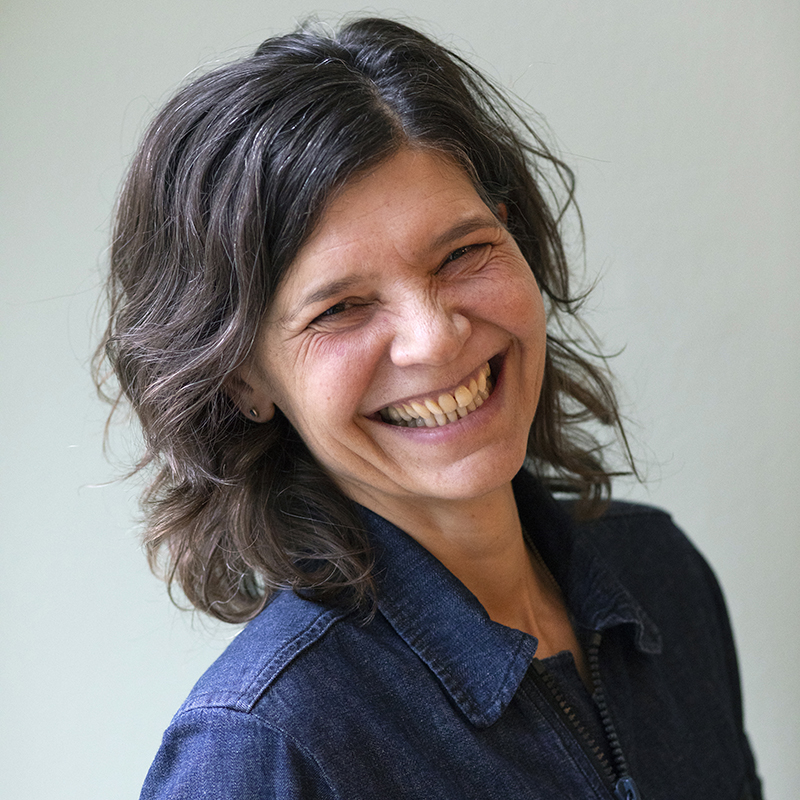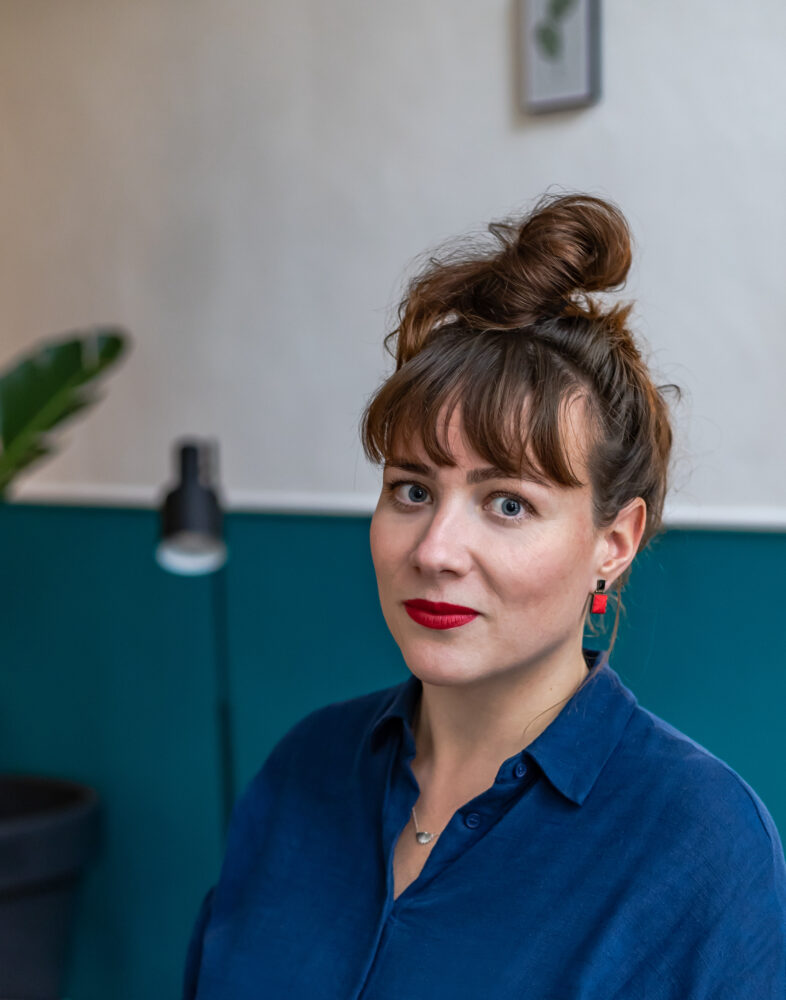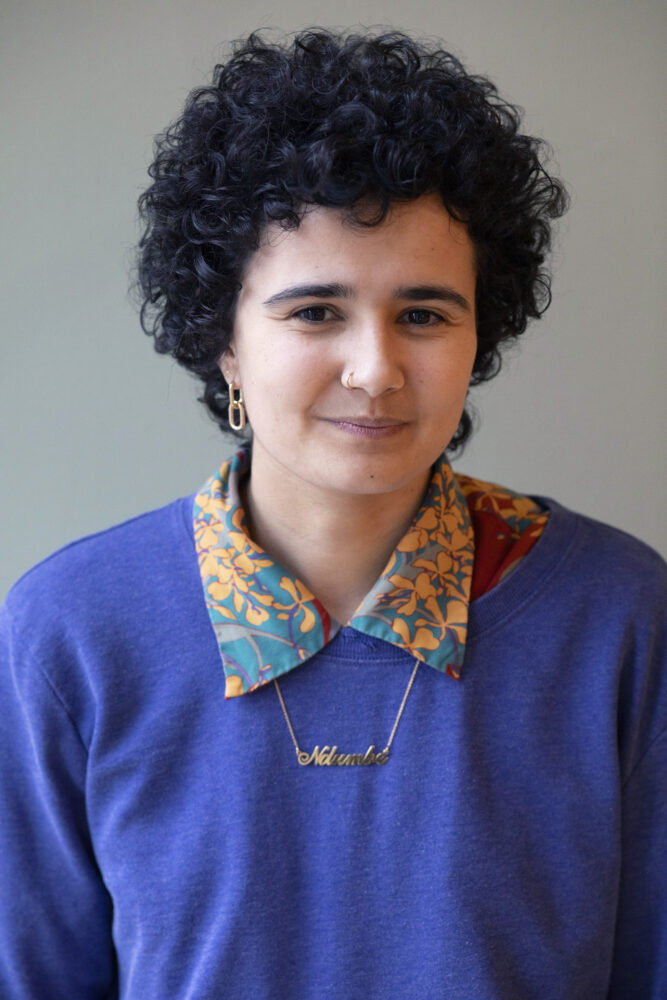The winner of the Digital Humanity Award sets an example against online exploitation and for women’s rights in the digital age.
At the age of 16, nude photos of Jantine are published online. At the age of 13, a sexy video of Cyrina is shared among classmates. The pictures spread quickly, what remains are shame and feelings of guilt. It was not until almost 20 years later that they took up the challenge of telling their stories. In collaboration with Paulien Geerlings and Nina van Tongeren, Jantine Jongebloed conveys the events through a montage of short scenes, directed by Eva Knibbe and played by young actresses. In parallel, Noelía Martin-Montalvo created a digital avatar, Patchwork Girl, to regain control of their story. This reveals a disturbing reality: AI-generated products as well as avatars are far more regulated and protected online than women.
The performance ends with an act of solidarity towards all women. In speaking out the artist not only take back the power in their story but also play an active part in giving other women hope. They create empowering role models, emphasizing the need for humane digital practices, which is why they were honoured with the Digital Humanity Award. In an interview, the artists reveal more about their project, its development and their goals and wishes.
What was the trigger for the project and deciding to speak out about the experience of being victimized online?
Eva Knibbe: A few years ago, my 13-year-old niece sent a sexy video to a boy she liked. A few days later the video was spread in the two schools in her village. She was called a slut and a whore, chased and shouted at. It was like a medieval witch hunt. She is not the only one with this experience; there are many shame and expose- groups on Telegram, in which private content of young girls is shared, including address details and telephone numbers.
I felt the need to give my niece and other victims of shame sexting the opportunity to respond to the people who watch their private content. The idea of an avatar that would visit porn sites and Telegram groups, came up. She could speak for all of us.
Jantine Jongebloed: The article about my experience with online sexual abuse and tracking down ‘my’ perpetrators, which I wrote for Volkskrant Magazine in 2021, went viral; I received hundreds of messages. But still I felt something else was needed: a confrontation, not only on paper but with an audience in real life. I wanted people to see I am an actual human being.
How did the involvement of the five teen girls from acting school impact the performance? Did they bring any new insights to the projects?
Eva Knibbe: The teenage actresses are more knowledgeable than we are on what it’s like to be a young woman today. What are the rules, what are the do’s and don’ts? The common belief among students, is that you are to blame if images of you are spread, even if you’re still a minor. This was confirmed by our actresses. They had all, at some point, seen private content pass by. None of them agreed with this, but they didn’t support the victim either.
Jantine Jongebloed: I interviewed the young performers about their experience with sexting, slutshaming and sexual taboos. With their input, we created a show that was not only about me having been victimized in 2004, but about what it’s generally like to be a young woman.
You faced many challenges during the development of your project – from not finding any other victims that wanted to share their stories to having to creating the avatar used from scratch because of the apparently much stricter legal protection of such products. How did those challenges influence the outcome of Patchwork Girl?
Paulien Geerlings: These challenges had a major impact on Patchwork Girl. We made the obstacles we encountered into the performance itself because they revealed a lot. There was a huge contrast between the crippling shame that befell the victims – which we therefore could not find – and the ruthless world of the internet. Online, there is no (legal) protection for women in any way. We found an indifferent men’s world that was even able to transform our own Patchwork Girl Telegram group into a platform to trade girlfriends. This closed off system, only protects itself. It’s inaccessible for outsiders, but once you’re in, you enter the domain of men who not only share images, but also best practices to avoid legislation. One of our followers on Telegram immediately wanted to know how we had created our avatar ‘using your girlfriend’s face’. Presumably he wanted to try something similar for himself.
In which ways do you hope Patchwork Girl will contribute to women taking back their power especially in the face of online exploitation and slut-shaming?
Paulien Geerlings: The digital avatar Patchwork Girl, ironically reclaims girls’ and women’s humanity. The online platforms on which images are spread, reduce women to objects, but Patchwork Girl defies expectations by speaking out. All her language was given to her by women, who are now heard, through her voice.
The performance ends with an act of solidarity – can you shortly explain this decision and it’s significance?
Paulien Geerlings: First of all, female solidarity is not a given in any way. Since the first women were burned as witches, women have been played out against each other. We created Patchwork Girl with an all-female, intergenerational artistic team. It became clear to us that we were all facing the same patriarchal system of oppression. Women still aren’t allowed to be in charge of their own sexuality. If their nudes are spread, they are subjected to victim-blaming. “They shouldn’t have taken pictures in the first place,” is the general response. We show that it’s your own free choice to take these pictures, and that it’s up to us women to stand by each other in whatever choice you make.
Which effect do you wish Patchwork Girl to have on the people it is exposed to?
Eva Knibbe: The image of the virgin woman, who saves herself for marriage, is deeply rooted in our culture. Sexting is often condemned, though there is nothing inherently wrong with it. The most open-minded advice for young girls seems to be: “If you have to engage in sexting, keep your face out of the picture.” While the advice should be: “Never forward anything and never send anything unsolicited.”
Jantine Jongebloed: Sexting is fun and shouldn’t have to cause any problems. At the end of the performance, I sent a new nude to my boyfriend. I never stopped taking photos, and I no longer take the blame for what happened to me.
How does your project challenge contemporary approaches to technology and refer to the themes of humanism and empowerment – in line with the Digital Humanity Award?
Paulien Geerlings: Patchwork Girl shows the ease with which the online world can ruin lives. New technology makes it super simple to fabricate and widely spread images. If there’s a picture of you out there, your identity can be easily abused. We’ve recently seen this in the wide array of women, ranging from teenage girls to famous politicians, of whom fake porn was created. Even though we know these images aren’t real, it’s been proven that your brain still considers them as such, which makes it all the more violating. These new ways of exploitation ask for new legislation. Patchwork Girl recently opened the conference “National Approach of Sexually Transgressive Behaviour” of the Dutch government. Hopefully it left a mark.
Noelía Martin-Montalvo: Patchwork Girl challenges contemporary approaches to technology by harnessing deepfakes and AI to empower, rather than victimize, women. Through personal stories like Jantine’s, we shed light on issues of objectification and hyper-sexualization. Rather than demonizing AI and social media, we transform them into tools for crafting new narratives where women command their own stories. This project delves into female rights in the digital age and encourages the safe exploration of femininity and sexuality.

Paulien Geerlings
Paulien Geerlings is a Dutch theatre-maker with an Indo-European background and member of the Board of Directors of the European Theatre Convention (ETC). After her high school education, she studied Philosophy and Theatre studies at the University of Amsterdam, gaining her MSc in 1997. In 2004 she received her MA at DasArts (currently DAS Theatre), a master’s programme for artistic practices in the field of theatre at the Amsterdam University of the Arts. Since her graduation in 1997 she has been working as a freelance dramaturge with several theatre directors, including Ola Mafaalani, the South-African based Bratt Bailey and Marcus Azzini. Since fourteen years, she is head of dramaturgy & international collaborations at de Toneelmakerij, the Amsterdam theatre company for young audiences. Both at de Toneelmakerij and at the ETC, she is the leading force behind diversity policies and gender equality. Next to this, she translated several plays, wrote theatre adaptations, taught at the Amsterdam University of the Arts and was a founding board member of Assitej NL. As a dramaturge, she has a strong focus on the development of new repertoire and the coaching of playwrights.

Jantine Jongebloed
Jantine Jongebloed (1987) is a writer and freelance journalist and interviewer for Volkskrant Magazine, Flow and LINDA.meiden, among others. Last year her literary debut ‘Sometimes I want a child’ was published by De Bezige Bij, and made the theater performance ‘Patchworkgirl’ with theatre company De Toneelmakerij, about sexting and online sexual abuse, following her prize-winning essay ‘Who put my nude photos online?’ (Volkskrant Magazine, 2021).

Noelía Martin-Montalvo
Noelia, a recent graduate of the BA in Interdisciplinary Arts from the Maastricht Institute of Arts, works on amplifying underrepresented narratives within the realms of climate justice, women’s rights and their intersectionality. Guided by a profound passion for cultures and anthropology, she has honed a participatory storytelling approach in her practice, employing diverse mediums including film, photography, graphic design, performance and recently AI art.

Eva Knibbe
Eva Knibbe (1985) is a theatre maker in the broadest sense of the word. Her work stands at the cross section of reality and fiction, giving space to thoughts we don’t want to acknowledge and a stage to people we rarely hear. For example, she made an endless list of all the stuff that crowds the world and filed a lawsuit against death. Last year, at the Toneelmakerij she made the performance Patchworkgirl. Currently her video installation Untitled is exhibited by Museum van de Geest in H’art. This work, oiginally created together with Paulien Geerlings for de Toneelmakerij, gives attention to the history and future of people with Down syndrome, imagining what it would be like if these people would only remain to exist in a museum.

Nina Van Tongeren
Nina van Tongeren, playwright and dramaturge, graduated from HKU in 2022. She wrote “Ndumbé and the Wolf Gang (9+)” and “Naar Ndakaaru zwemmen (8+)” about the colonial past. She currently works at the Toneelmakerij and writes freelance for various theaters. She wrote “Koekoeksnest (10+)” for Theater aan de Rijn. As an intersectional activist, she is committed to ensuring that her plays tell the stories of underrepresented children.
